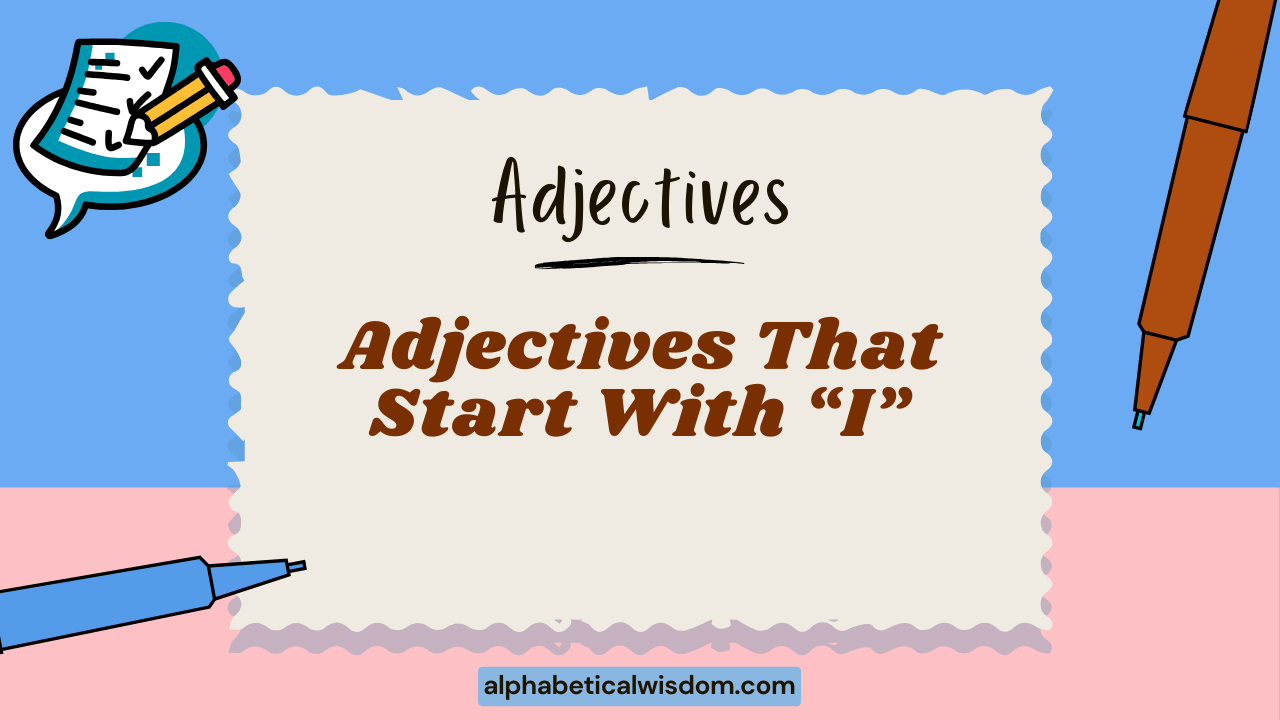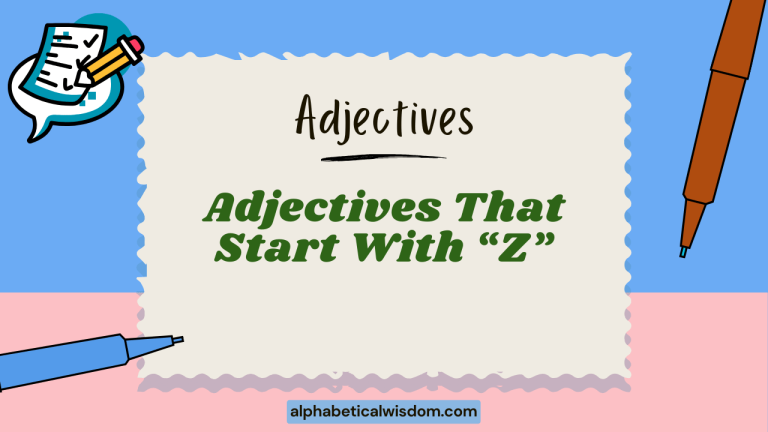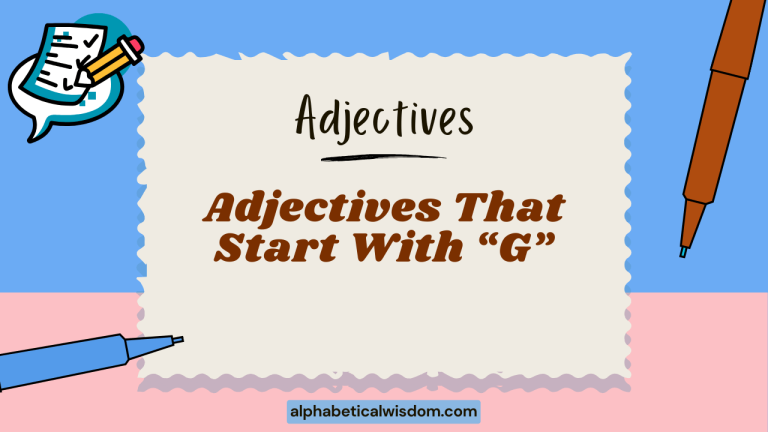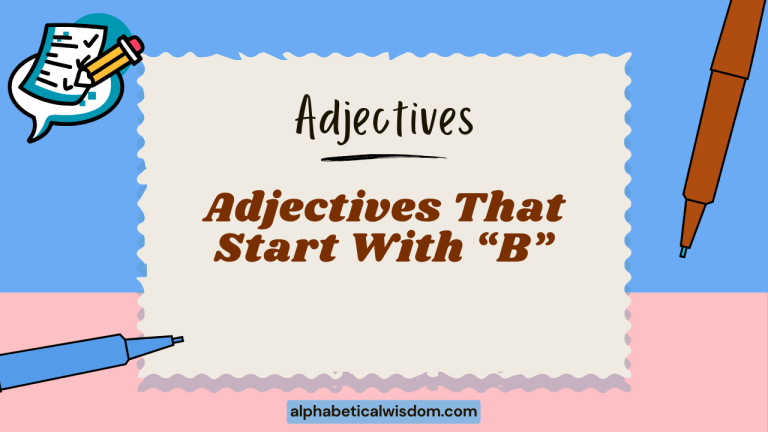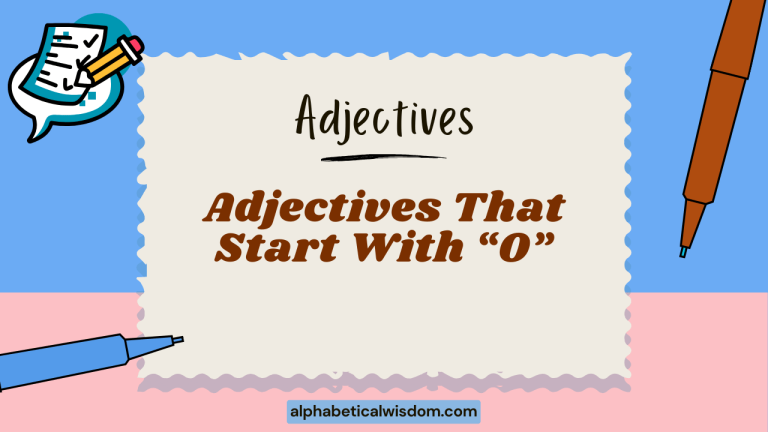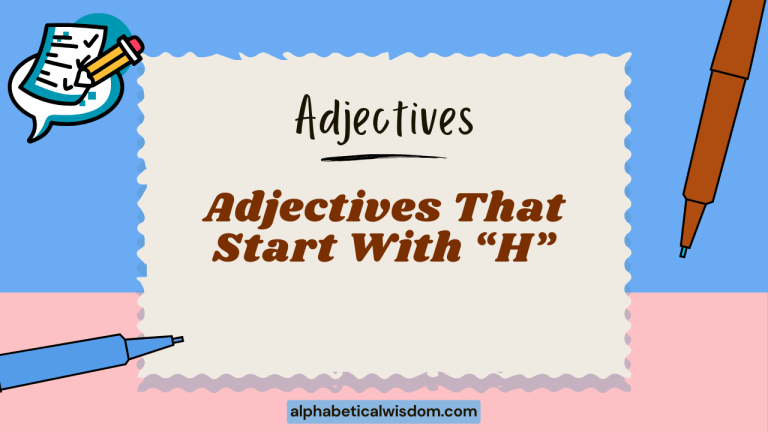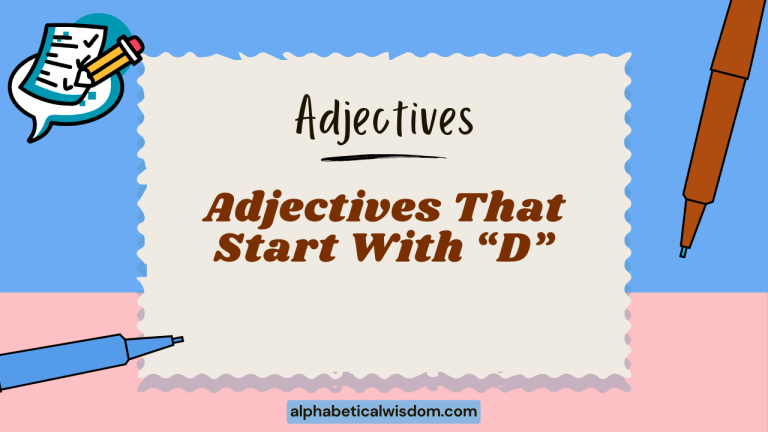Adjectives Starting With I: A Comprehensive Grammar Guide
Adjectives are essential components of the English language, enriching our descriptions and providing vivid details. Understanding adjectives that start with the letter ‘I’ can significantly enhance your vocabulary and improve your ability to express yourself with precision and flair.
This guide explores various adjectives beginning with ‘I,’ their meanings, usage, and nuances. Whether you’re a student, a writer, or simply an English enthusiast, this article will provide you with a solid understanding of these impactful words and how to use them effectively in your writing and speech.
This resource is designed to be accessible and informative for learners of all levels, from beginners to advanced speakers.
Table of Contents
- Introduction
- Definition of Adjectives
- Structural Breakdown
- Types and Categories of Adjectives Starting With “I”
- Examples of Adjectives Starting With “I”
- Usage Rules for Adjectives
- Common Mistakes When Using Adjectives Starting With “I”
- Practice Exercises
- Advanced Topics
- Frequently Asked Questions
- Conclusion
Definition of Adjectives
An adjective is a word that modifies a noun or pronoun, providing more information about it. Adjectives describe the qualities, characteristics, or attributes of the noun or pronoun they modify. They add detail and specificity to sentences, helping to create a clearer and more vivid picture for the reader or listener. Adjectives can answer questions like “What kind?”, “Which one?”, “How many?”, or “How much?” about the noun or pronoun they describe.
In English grammar, adjectives typically precede the noun they modify, but they can also follow a linking verb (such as is, are, was, were, seems, becomes) and function as a subject complement. Understanding the role and function of adjectives is crucial for constructing grammatically correct and descriptive sentences.
Structural Breakdown
The structure of adjectives is relatively simple: they are single words that directly modify nouns or pronouns. However, adjectives can also be part of more complex phrases, such as adjective phrases, which include modifiers that further describe the adjective itself.
For example, in the phrase “incredibly intelligent,” “incredibly” is an adverb modifying the adjective “intelligent.”
Adjectives do not change form based on the noun they modify, unlike verbs which must agree in number and tense. However, some adjectives have comparative and superlative forms (e.g., intelligent, more intelligent, most intelligent).
The position of an adjective in a sentence is also important. As mentioned earlier, adjectives usually come before the noun they modify (e.g., “an idyllic scene”) but can also follow a linking verb (e.g., “the scene is idyllic”).
Types and Categories of Adjectives Starting With “I”
Adjectives starting with the letter “I” can be categorized into several types based on their function and meaning. Here are a few key categories:
Descriptive Adjectives
Descriptive adjectives describe the qualities or characteristics of a noun. They provide specific details that help to paint a clearer picture.
These adjectives often relate to appearance, condition, or other observable features.
Evaluative Adjectives
Evaluative adjectives express an opinion or judgment about a noun. They indicate whether something is good or bad, desirable or undesirable.
These adjectives reflect the speaker’s or writer’s subjective assessment.
Adjectives of State
Adjectives of state describe the condition or status of a noun. They indicate the current situation or state of being.
These adjectives often describe temporary or changeable conditions.
Examples of Adjectives Starting With “I”
To illustrate the various types of adjectives starting with “I,” here are some examples organized by category.
Descriptive Adjectives Examples
The following table provides examples of descriptive adjectives that start with the letter “I,” along with example sentences to show how they are used.
| Adjective | Definition | Example Sentence |
|---|---|---|
| Icy | Covered with or resembling ice. | The road was icy this morning, making the commute dangerous. |
| Ideal | Perfect or most suitable. | This is an ideal location for a summer picnic. |
| Identical | Exactly alike or similar. | The twins were identical, and it was hard to tell them apart. |
| Illustrious | Well-known, respected, and admired for past achievements. | She had an illustrious career as a concert pianist. |
| Immaculate | Perfectly clean, neat, or tidy. | The house was immaculate, as if no one lived there. |
| Immense | Extremely large or great, especially in scale or degree. | The ocean seemed immense and endless. |
| Impartial | Treating all rivals or disputants equally; fair and just. | A judge must remain impartial in all cases. |
| Impassable | Impossible to travel along or over. | The heavy snow made the mountain road impassable. |
| Imperative | Of vital importance; crucial. | It is imperative that we act now to reduce pollution. |
| Imposing | Grand and impressive in appearance. | The castle was an imposing structure on the hilltop. |
| Impractical | Not adapted for use or action; not sensible or realistic. | Wearing high heels for hiking is impractical. |
| Impressive | Evoking admiration through size, quality, or skill. | The athlete’s performance was truly impressive. |
| Improved | Having become or been made better. | The improved version of the software is much faster. |
| Inaccessible | Unable to be reached or entered. | The remote village was inaccessible by car. |
| Inaccurate | Not accurate; containing mistakes or errors. | The report contained inaccurate information. |
| Inadequate | Not sufficient; lacking the quality or quantity required. | The food supply was inadequate to feed everyone. |
| Incandescent | Emitting light as a result of being heated. | The incandescent bulb provided a warm glow. |
| Incisive | Intelligently analytical and clear-thinking. | Her incisive comments cut straight to the heart of the matter. |
| Incredible | Difficult to believe; extraordinary. | The magician performed an incredible feat. |
| Indelible | Making marks that cannot be removed. | The experience left an indelible mark on her memory. |
| Independent | Not depending on another for livelihood or subsistence. | She is an independent woman who makes her own decisions. |
| Indescribable | Too unusual, extraordinary, or extreme to be adequately described. | The beauty of the sunset was indescribable. |
| Indigenous | Originating or occurring naturally in a particular place; native. | The indigenous plants are well-suited to the local climate. |
| Individual | Single; separate. | Each individual student has unique needs. |
| Infinite | Limitless or endless in space, extent, or size. | The universe seems to have infinite possibilities. |
| Influential | Having a great influence on someone or something. | She is an influential figure in the art world. |
| Informative | Providing useful or interesting information. | The documentary was highly informative. |
| Ingenious | Clever, original, and inventive. | The inventor came up with an ingenious solution. |
| Inherent | Existing in something as a permanent, essential, or characteristic attribute. | Creativity is inherent in human nature. |
This table showcases a variety of descriptive adjectives starting with “I,” demonstrating their diverse meanings and applications in everyday language. These adjectives enhance the clarity and richness of descriptions, making communication more effective.
Evaluative Adjectives Examples
This section provides examples of evaluative adjectives that start with the letter “I,” along with example sentences to illustrate their usage.
| Adjective | Definition | Example Sentence |
|---|---|---|
| Idiotic | Extremely stupid or foolish. | That was an idiotic thing to do. |
| Ignoble | Not honorable in character or purpose. | His actions were driven by ignoble motives. |
| Ill-advised | Unlikely to produce a good result; unwise. | It was an ill-advised decision to invest all his money. |
| Illicit | Forbidden by law, rules, or custom. | They were involved in illicit activities. |
| Immature | Not fully developed; childish. | His behavior was immature for his age. |
| Immoral | Not conforming to accepted standards of morality. | Cheating on the exam was an immoral act. |
| Imprudent | Not showing care for the consequences of an action; rash. | It would be imprudent to ignore the warning signs. |
| Inadequate | Not good enough; insufficient. | His performance was inadequate for the role. |
| Inane | Silly; empty. | They were making inane comments. |
| Inappropriate | Not suitable or proper in the circumstances. | His language was inappropriate for the occasion. |
| Inauspicious | Not conducive to success; unpromising. | The day started with an inauspicious event. |
| Incompetent | Not having the necessary skills to do something successfully. | He was an incompetent manager. |
| Inconsiderate | Thoughtlessly causing hurt or inconvenience to others. | It was inconsiderate of him to play loud music late at night. |
| Indecent | Not conforming to generally accepted standards of behavior. | His behavior was indecent and offensive. |
| Inferior | Lower in rank, status, or quality. | The product was of inferior quality. |
| Insensitive | Showing or feeling no concern for others’ feelings. | His comments were insensitive and hurtful. |
| Insidious | Proceeding gradually or subtly but with harmful effects. | The insidious disease slowly weakened her. |
| Insipid | Lacking flavor; dull or uninteresting. | The soup was bland and insipid. |
| Intolerable | Unable to be endured. | The pain was intolerable. |
| Irascible | Having or showing a tendency to be easily angered. | He was an irascible old man. |
| Irksome | Annoying; irritating. | The buzzing of the mosquito was irksome. |
| Irresponsible | Not showing a proper sense of responsibility. | It was irresponsible of him to leave the children alone. |
| Insupportable | Unable to be supported or justified. | His claims were insupportable. |
| Insurmountable | Too great to be overcome. | The challenges seemed insurmountable. |
| Intransigent | Unwilling or refusing to change one’s views or to agree about something. | The negotiator remained intransigent despite the pressure. |
| Irrevocable | Not able to be changed, reversed, or recovered; final. | The decision was irrevocable. |
| Ironical | Happening in the opposite way to what is expected, and typically causing wry amusement because of this. | It was ironical that he failed the test after studying so hard. |
| Invalid | Not valid or correctly reasoned. | The argument was based on invalid assumptions. |
| Impious | Not showing respect or reverence, especially for a god. | His impious remarks offended many people. |
Evaluative adjectives provide essential insights into the quality or worth of something, influencing perceptions and shaping opinions. Using these adjectives effectively can add depth and perspective to your writing.
Adjectives of State Examples
This section provides examples of adjectives of state that start with the letter “I,” along with example sentences to illustrate their usage.
| Adjective | Definition | Example Sentence |
|---|---|---|
| Idle | Not active or in use. | The machinery was idle during the power outage. |
| Ill | Not in good health; sick. | She was feeling ill and stayed home from work. |
| Immobile | Not moving; motionless. | The injured bird was immobile on the ground. |
| Inclement | (of the weather) unpleasantly cold or wet. | Due to the inclement weather, the game was cancelled. |
| Indisposed | Slightly unwell. | He was indisposed and unable to attend the meeting. |
| Inert | Lacking the ability or strength to move. | The body lay inert on the floor. |
| Inflamed | Reddened, swollen, and painful as a result of inflammation or injury. | The wound was inflamed and required medical attention. |
| Infected | Containing germs or bacteria. | The cut became infected. |
| Insane | In a state of mental illness. | He was declared legally insane. |
| Isolated | Far away from other places, buildings, or people; remote. | The village was isolated by the snowstorm. |
| Imprisoned | Kept in prison. | He was imprisoned for his crimes. |
| Injured | Physically harmed or wounded. | The injured player was taken off the field. |
| Intoxicated | Affected by alcohol or drugs. | He was intoxicated and unable to drive. |
| Inattentive | Not paying attention. | The students were inattentive during the lecture. |
| Insecure | Not confident or assured. | She felt insecure about her abilities. |
| Ill-equipped | Not having the necessary equipment or resources. | They were ill-equipped for the journey. |
| Ill-fated | Destined to fail or have bad luck. | The ill-fated voyage ended in disaster. |
| Immature | Not fully developed. | The fruit was still immature and not ready to be picked. |
| Impacted | Firmly fixed or pressed together. | The impacted wisdom tooth needed to be removed. |
| Implied | Suggested but not directly expressed. | There was an implied threat in his words. |
| Impoverished | Made poor. | The family was impoverished after losing their jobs. |
| In debt | Oweing money. | He was deeply in debt after the business failed. |
| Indebted | Owing gratitude. | I am indebted to you for your help. |
| In despair | Having lost all hope. | She was in despair after the accident. |
| In hiding | Concealed from sight. | The fugitive was in hiding from the police. |
| In love | Feeling romantic love. | They were deeply in love with each other. |
| In pain | Experiencing physical discomfort. | He was in pain after the surgery. |
| In trouble | Experiencing difficulties or problems. | The company was in trouble due to poor sales. |
| In use | Being used. | The equipment was in use at the time of the accident. |
Adjectives of state provide valuable information about the current condition or status of a noun, adding context and detail to descriptions. These adjectives are essential for conveying specific situations and scenarios.
Usage Rules for Adjectives
Adjectives follow specific rules in English grammar. Here are some key guidelines to remember:
- Placement: Adjectives usually come before the noun they modify (e.g., “an impressive building”). However, they can also follow linking verbs (e.g., “The building is impressive”).
- Order of Adjectives: When using multiple adjectives, there is a general order to follow: opinion, size, age, shape, color, origin, material, and purpose (e.g., “a beautiful large old round blue Italian silk scarf”).
- Comparative and Superlative Forms: Many adjectives have comparative and superlative forms to show degrees of comparison. For shorter adjectives, add “-er” and “-est” (e.g., “icy, icier, iciest”). For longer adjectives, use “more” and “most” (e.g., “impressive, more impressive, most impressive”).
- Coordinate Adjectives: When using two or more adjectives of equal rank to modify the same noun, separate them with a comma (e.g., “an intelligent, hard-working student”). If the adjectives are not of equal rank, do not use a comma (e.g., “a dark blue car”).
Common Mistakes When Using Adjectives Starting With “I”
Even experienced English speakers sometimes make mistakes with adjectives. Here are some common errors to watch out for:
- Incorrect Placement: Placing an adjective after the noun when it should come before (Incorrect: “building impressive,” Correct: “impressive building”).
- Misusing Comparative and Superlative Forms: Using “more” or “most” with short adjectives that should take “-er” and “-est” (Incorrect: “more icy,” Correct: “icier”).
- Incorrect Comma Usage: Adding commas between adjectives that are not coordinate (Incorrect: “a dark, blue car,” Correct: “a dark blue car”).
- Using Adjectives as Adverbs: Using an adjective instead of an adverb to modify a verb (Incorrect: “He performed impressive,” Correct: “He performed impressively”).
Here are some examples of common mistakes and their corrections:
| Incorrect | Correct | Explanation |
|---|---|---|
| The landscape was immense beautiful. | The landscape was immensely beautiful. | “Immense” (adj) should be “Immensely” (adv) to modify the adjective “beautiful.” |
| More ideal location. | Ideal location. | “Ideal” already implies perfection; “more” is redundant. |
| She is a independent, strong woman. | She is an independent, strong woman. | “Independent” and “strong” are coordinate adjectives, so a comma is needed. Also, “an” is used before “independent” because it starts with a vowel sound. |
| The child was insensitive. | The child was insensitive. | No correction needed, the sentence is correct. |
| He spoke in a inaudible voice. | He spoke in an inaudible voice. | The article “a” should be “an” because “inaudible” starts with a vowel sound. |
Practice Exercises
Test your understanding of adjectives starting with “I” with these exercises. Fill in the blanks with the appropriate adjective from the word bank provided.
Exercise 1: Fill in the Blanks
Word Bank: icy, ideal, identical, immense, impartial, imposing, impractical, impressive, inaccurate, inadequate
| Question | Answer |
|---|---|
| 1. The judge remained _________ throughout the trial. | impartial |
| 2. The mountain range was _________, stretching as far as the eye could see. | immense |
| 3. Wearing sandals in the snow is _________. | impractical |
| 4. The two paintings were almost _________. | identical |
| 5. The evidence presented was _________ and unreliable. | inaccurate |
| 6. The conditions were _________ for a winter storm. | ideal |
| 7. The dancer’s performance was truly _________. | impressive |
| 8. The castle was an _________ sight on the horizon. | imposing |
| 9. The food supply was _________ to feed the entire village. | inadequate |
| 10. The roads were _________ this morning due to the freezing rain. | icy |
Exercise 2: Correct the Sentence
Correct the sentences below, paying attention to the correct placement and usage of adjectives starting with “I.”
| Question | Answer |
|---|---|
| 1. The landscape was immense beautiful. | The landscape was immensely beautiful. |
| 2. More ideal location for a picnic. | Ideal location for a picnic. |
| 3. He made a illogical decision. | He made an illogical decision. |
| 4. The child was insensitive and rude. | The child was insensitive and rude. |
| 5. She is a independent, strong woman. | She is an independent, strong woman. |
| 6. The weather was inclement bad. | The weather was inclement. |
| 7. This is an inaccurate, old map. | This is an inaccurate old map. |
| 8. The solution was ingenious, simple. | The solution was ingenious and simple. |
| 9. He is an influence individual. | He is an influential individual. |
| 10. The food was insipid, tasteless. | The food was insipid and tasteless. |
Exercise 3: Sentence Completion
Complete each sentence with an appropriate adjective starting with “I.”
| Question | Answer |
|---|---|
| 1. The __________ old building was a landmark in the city. | imposing |
| 2. It was __________ of him to forget her birthday. | inconsiderate |
| 3. The __________ task seemed impossible to complete. | immense |
| 4. The __________ twins were hard to tell apart. | identical |
| 5. The __________ conditions made it dangerous to travel. | icy |
| 6. His __________ remarks caused a lot of offense. | indecent |
| 7. The __________ student always asked insightful questions. | intelligent |
| 8. The __________ weather forced us to cancel the picnic. | inclement |
| 9. The __________ mountain peak was covered in snow. | isolated |
| 10. The __________ man refused to compromise. | intransigent |
Advanced Topics
For advanced learners, consider exploring these more complex aspects of adjective usage:
- Abstract Adjectives: Adjectives that describe abstract concepts, such as “idealistic” or “intellectual.”
- Adjective Clauses: Dependent clauses that function as adjectives, modifying nouns or pronouns (e.g., “The book that I borrowed from the library is very interesting”).
- Participial Adjectives: Verb forms used as adjectives (e.g., “a running stream,” “a broken vase”).
Understanding these advanced topics will provide a deeper appreciation for the versatility and complexity of adjectives in English.
Frequently Asked Questions
- What is the difference between an adjective and an adverb?
An adjective modifies a noun or pronoun, while an adverb modifies a verb, adjective, or another adverb. Adjectives describe qualities or characteristics, while adverbs describe how, when, where, or to what extent an action is performed.
- Can an adjective modify another adjective?
No, an adjective cannot directly modify another adjective. Instead, adverbs are used to modify adjectives (e.g., “incredibly intelligent,” where “incredibly” is an adverb modifying the adjective “intelligent”).
- What is the correct order of adjectives in a sentence?
When using multiple adjectives, there is a general order to follow: opinion, size, age, shape, color, origin, material, and purpose (e.g., “a beautiful large old round blue Italian silk scarf”).
- How do I form the comparative and superlative forms of adjectives?
For shorter adjectives, add “-er” and “-est” (e.g., “icy, icier, iciest”). For longer adjectives, use “more” and “most” (e.g., “impressive, more impressive, most impressive”). There are some irregular adjectives that have unique comparative and superlative forms (e.g., “good, better, best”).
- What are coordinate adjectives?
Coordinate adjectives are two or more adjectives of equal rank that modify the same noun. Separate them with a comma (e.g., “an intelligent, hard-working student”). If the adjectives are not of equal rank, do not use a comma (e.g., “a dark blue car”).
- What are participial adjectives?
Participial adjectives are verb forms used as adjectives. They can be present participles (ending in “-ing”) or past participles (usually ending in “-ed” or “-en”) (e.g., “a running stream,” “a broken vase”).
- What is an adjective clause?
An adjective clause is a dependent clause that functions as an adjective, modifying a noun or pronoun. It typically begins with a relative pronoun (who, whom, which, that) or a relative adverb (where, when, why) (e.g., “The book that I borrowed from the library is very interesting”).
- Are there any adjectives that start with “I” that should be avoided in formal writing?
While most adjectives starting with “I” are acceptable in formal writing, some evaluative adjectives like “idiotic” or “inane” might be considered too informal or subjective. Choose your words carefully based on the context and tone of your writing.
- How can I improve my use of adjectives in writing?
To improve your adjective usage, focus on expanding your vocabulary, paying attention to the specific meanings and connotations of different adjectives. Also, practice using adjectives in your writing and seek feedback from others to identify areas for improvement.
- Is it possible to have too many adjectives in a sentence?
Yes, it is possible to overuse adjectives, which can make your writing sound cluttered and less effective. Use adjectives sparingly and choose them carefully to add the most impact and clarity to your descriptions. Prioritize quality over quantity.
Conclusion
Mastering adjectives, especially those starting with the letter “I,” is crucial for enhancing your English language skills. This guide has provided a comprehensive overview of adjectives, including their definition, structure, types, usage rules, and common mistakes.
By understanding these concepts and practicing regularly, you can significantly improve your ability to express yourself with clarity and precision.
Remember to focus on expanding your vocabulary, paying attention to the nuances of different adjectives, and practicing their correct usage in your writing and speech. With dedication and effort, you can become proficient in using adjectives to create vivid and impactful descriptions.
Keep practicing and refining your skills to achieve fluency and confidence in English.
